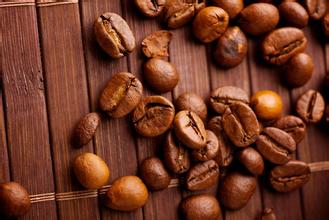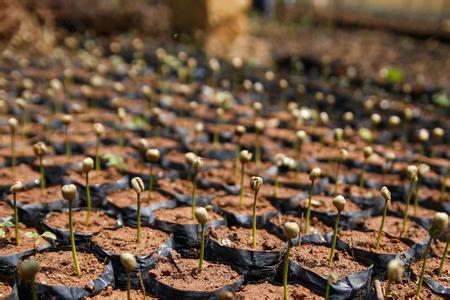The treatment of hard Indonesian Manning Coffee beans introduction to the Grinding degree of varieties in Manor production area
Manning's suffering will not upset you, but will make you feel more awake. Before you encounter real pain, Manning is just an ordinary drink with a bitter taste, a refreshing liquid, a tool to slow you down, and it can't feel your grievance yet. but there are many people who are madly infatuated with Mantenin's bitterness, as if they can't quit if they are poisoned. If you want to know why, they will smile and tell you: "because love is bitter." Manning style Manning leaping micro-acid mixed with the richest aroma, so that you can easily taste the lively factor in the mild fragrance, its outstanding taste has confused many suitors.
In the 17th century, the Dutch first introduced Arabica saplings to Ceylon (present-day Sri Lanka) and Indonesia. In 1877, a large-scale disaster hit the Indonesian islands, coffee rust destroyed almost all the coffee trees, people had to give up Arabica, which had been in operation for many years, and introduced the disease-resistant Robusta coffee tree from Africa. Indonesia today is a big coffee producer. Coffee is mainly produced in Java, Sumatra and Sulawi, with Robusta accounting for 90% of the total production. Sumatra Manning is a rare Arabica species. Planted on hillsides between 750m and 1500 m above sea level, the mysterious and unique Sumatran species give Mantenin coffee a rich aroma, rich taste, strong flavor, slightly chocolate and syrup flavor.
During the Japanese occupation of Indonesia during World War II, a Japanese soldier drank mellow coffee in a cafe, so he asked the shopkeeper the name of the coffee, and the boss mistook him for asking where you were from, so he replied: Mandaining. After the war, the Japanese soldiers recalled the "manning" they had drunk in Indonesia. As a result, 15 tons of Indonesian coffee was transported to Japan, which was very popular. That's how Manning's name came out, and the coffee merchant is now the famous PWN Coffee Company. Known as Mantenin mandheling, it is produced all over Lake Toba in northern Sumatra. The finished product has a unique fragrance of herbs and trees.
Gold Mantenin, the Japanese adopted more stringent quality control more than a decade ago. After picking beans manually for four times, they eliminated defective beans and produced gold mantenin with dark green color and equal appearance of beans, creating another wave of market demand. Even Europe and the United States are crazy about it.
The aged Agedmandheling is as sweet as honey. The successful old bean has worn away Manning's inelegant sour taste. The sour ingredients are ripe and converted to sugar, making the coffee more round and sweeter to drink. Manning is like a coffee zombie in the old age of failure, and the taste is difficult to taste.
Sumatra Manning is a rare Arabica species. These trees are planted on hillsides between 750m and 1500 meters above sea level, mysterious and unique Sumatra, giving Mantenin coffee, rich aroma, rich taste, strong flavor. Make it unique, with a hint of chocolate and syrup.
Mantenin coffee beans have large granules and hard beans, and they are prone to defects in the process of planting. After harvest, they are usually subject to strict manual selection. If the control process is not strict enough, it is easy to cause a mixture of good and bad quality. in addition, the different degree of baking will also directly affect the taste, so it has become a more controversial single product. Mantenin has a strong taste, with a strong mellow and rich and lively sense of movement, neither astringent nor sour, mellow and bitter can be fully revealed. The appearance of Mantenin coffee beans is arguably the ugliest, but coffee fans say that the worse the Sumatran coffee beans are, the better, mellow and slippery they are.

Important Notice :
前街咖啡 FrontStreet Coffee has moved to new addredd:
FrontStreet Coffee Address: 315,Donghua East Road,GuangZhou
Tel:020 38364473
- Prev

Introduction to the description of the characteristics and flavor of the manor area by the grinding scale treatment of Panamanian coffee beans
On the basis of very excellent quality, the very people-friendly price makes this coffee bean cost-effective. What is special about this coffee bean is that it is made up of three varieties, of which 40% are rosy summer varieties, giving this coffee a distinct rosy summer flavor. According to the information obtained, due to the historical reasons of the manor, the early rose summer varieties were in pursuit of yield at that time.
- Next

Flavor of Jamaica Blue Mountain Coffee Bean Grind Scale Characteristics Taste Treatment Introduction
Blue Mountain Coffee is the world's premier coffee, and Jamaica's weather, geology and terrain combine to provide the ideal location. Ridges running through Jamaica extend to the east of the island, and the Blue Mountains rise to more than 2100 meters. The weather is cool, foggy and rainy frequently. Use this rich soil to harmonize with rainwater. Here is the use of mixed planting methods to grow coffee trees, so that they are fragrant in terraces
Related
- Detailed explanation of Jadeite planting Land in Panamanian Jadeite Manor introduction to the grading system of Jadeite competitive bidding, Red bid, Green bid and Rose Summer
- Story of Coffee planting in Brenka region of Costa Rica Stonehenge Manor anaerobic heavy honey treatment of flavor mouth
- What's on the barrel of Blue Mountain Coffee beans?
- Can American coffee also pull flowers? How to use hot American style to pull out a good-looking pattern?
- Can you make a cold extract with coffee beans? What is the right proportion for cold-extracted coffee formula?
- Indonesian PWN Gold Mandrine Coffee Origin Features Flavor How to Chong? Mandolin coffee is American.
- A brief introduction to the flavor characteristics of Brazilian yellow bourbon coffee beans
- What is the effect of different water quality on the flavor of cold-extracted coffee? What kind of water is best for brewing coffee?
- Why do you think of Rose Summer whenever you mention Panamanian coffee?
- Introduction to the characteristics of authentic blue mountain coffee bean producing areas? What is the CIB Coffee Authority in Jamaica?

